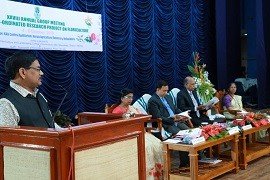Agrifuture conference will show future options for farmers in South-east Asia.
Agrifuture Conference & Exhibition will take place in Bangkok in early December. It will cover a wide range of workshop topics to meet every interest. A One-day conference will be complemented by a day of visits to progressive Thai farms.
A brand new event from the organisers of Agritechnica Asia, the DLG (German Agricultural Society) and VNU Exhibitions Asia Pacific, will take place in Bangkok, Thailand, on the 2nd and 3rd of December 2019. The format of Agrifuture Conference & Exhibition is a one-day international conference and accompanying mini-exhibition, followed by a networking evening and a day of farm visits.
Bangkok’s True Digital Park, Thailand’s first and Southeast Asia’s largest start-up and tech entrepreneurs’ campus, will host the event, which has taken the theme “Prepare yourself for tomorrow’s agri-business”. It is expected to attract attendees involved in all sectors of agricultural production from across the region with its comprehensive conference and workshop programme featuring expert speakers.
Conference programme
The topic for the morning session at the Agrifuture Conference will be on “New Ag-Business Opportunities”. Speakers will include Dr Wolfgang H. Pfeiffer of HarvestPlus, an IFPRI program, with his presentation on “Catalysing bio fortified food systems with partners in supply chain and market development”. He will look at how to tackle malnutrition globally by breeding iron, zinc and vitamin A into staple food crops, and builds food systems through inclusive, sustainable markets.
Meanwhile, Martin Gummert (International Rice Research Institute, IRRI) will discuss “Value chain upgrading from harvesting to markets for sustainable rice production”. Djaja Wisman, whose roles include involvement with the Dairy Working Group of PISAgro and Vice Chairman of Committee for Food Processing & Dairy Industry at the KADIN/Indonesian Chamber of Trade and Industry, will look at “Dairy farming in Indonesia, current situation and outlook in the next five years”. Dr Dares Kittiyopas, who is President of the Thai Society of Agricultural Engineering, Deputy Director-General at Thailand’s Department of Agricultural Extension and Luminary of Agricultural Logistics of Thailand Research Fund, will discuss “Pre-conditions for smart farming in Southeast Asia”. All of them will highlight challenges as well as chances of new developments in farming and agri-business.
Choice of afternoon topics
Conference delegates will have a choice of presentations in the afternoon, with five sessions available:
Session 1 will look at “Novel tools for smart crop management” and includes Dr Michal Levy, the Senior Deputy Director-General of Agricultural Innovation at the Israeli Ministry of Agriculture and Rural Development talking about “Boosting agricultural innovation”.
Session 2 covers “Innovations in sugarcane farming” by Michael O’Connor of Gessner Industries, who will examine “Mechanisation of Sugarcane Farms in SE Asia”.
Session 3 is “Laser levelling in rice production” including a Round Table discussion with the title “Laser levelling in Thailand” moderated by the IRRI and Department of Rice, of Thailand’s Ministry of Agriculture and Cooperatives.
Session 4 is “Upcoming concepts for financing mechanisation”, where speakers include Roland Treitler, Financial Advisor at German International Cooperation (GIZ), who will highlight “Financial innovation for mitigation measures in the agricultural sector”.
Session 5 is “Vertical farming – The future of Asia’s food security” by Assistant Professor Dr Siriwat Sakhonwasee of Faculty of Agricultural Production, Thailand’s Maejo University who will give a presentation titled “Upcoming trends in vertical farming”.
Field visits to progressive farms
On the second day of the conference there will be visits to selected farms, where experts will demonstrate and discuss the use of agricultural techniques and modern technology for optimising farming efficiency in various crops including rice, sugar cane, cassava, maize, oil palm and vegetables.
The highlight of the day will be an exclusive site visit to machinery manufacturer Kubota’s experienced modern farm in Chon Buri Province. Kubota is Innovation Partner of the Agrifuture Conference, and delegates will be able to hear more about the company’s vision to be a leader in farm and industrial machinery in Southeast Asia, with its Agri-innovative solutions helping farmers achieve a better and sustainable life.
The DLG’s Katharina Staske, the project manager of Agritechnica Asia, said the new Agrifuture Conference & Exhibition had been introduced to complement Agritechnica Asia, which will take place for the third time from 7th to 9th May 2020 in Bangkok.
“Along with our international farmers’ network, the DLG has expanded its relationship with farmers in Southeast Asia, including those in Thailand,” added Staske. “It is through working with these farmers that we have come up with this new conference. It will focus on specific production areas that require targeted technical solutions, and will bring together farmers motivated by opportunities for knowledge acquisition.”
Agrifuture conference will show future options for














